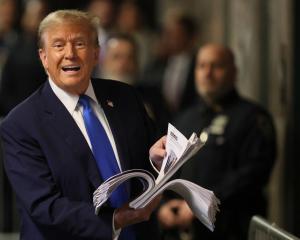Police and the Indian franchise of the US chain said no one was hurt in the attack, which came amid unrelenting rage in India over the arrest and subsequent strip-search of Devyani Khobragade for visa fraud and under-payment of her housekeeper.
India has demanded that the charges be dropped against the diplomat. Her father threatened to begin a fast if US authorities press ahead with the case.
Police in Mumbai said they were stepping up patrolling of major US outlets including McDonald's after workers of the small Republican Party of India attacked the Dominos store. The group sent pictures to media organisations showing a broken glass door.
"The fact is that (the) American authorities have behaved atrociously with an Indian diplomat. And obviously, America has to make good for its actions," said Manish Tiwari, India's minister for information and broadcasting.
"So therefore, I think it is a legitimate expectation, that if they have erred, and they have erred grievously in this matter, they should come forth and apologise."
In a possible sign of a way out of the crisis, the United Nations said it received an official request from India to accredit Khobragade as a member of that country's permanent U.N. mission in what appeared to be a move to give her a stronger form of diplomatic immunity.
US State Department spokeswoman Jen Psaki, however, said any change in the diplomat's accreditation status would not provide a "clean slate from past charges."
Asked whether diplomatic immunity could prevent Khobragade from being arrested again or enable her to leave the United States - a possible solution to the matter - Psaki said, "I don't want to speculate on that."
She side-stepped a question as to whether the United States would apologise to India over the matter but underscored the importance of US-Indian relations.
"We certainly fully agree that it's important to preserve and protect our partnership. It's not just about diplomatic ties," Psaki told reporters, citing more than $90 billion in bilateral trade, close counterterrorism cooperation and engagement on a range of topics including Afghanistan.
"And we want to move beyond this, and I think we all recognize the importance of our long-term relationship," Psaki added.
US Secretary of State John Kerry expressed regret over the case in a phone call to India's national security adviser this week, but US prosecutors have defended the investigation against Khobragade and her treatment.
Khobragade was arrested last week and released on $250,000 bail after giving up her passport and pleading not guilty to charges of visa fraud and making false statements about how much she paid her housekeeper. She faces a maximum of 15 years in prison if convicted on both counts.
The US Justice Department confirmed that Khobragade was strip-searched after her arrest. A senior Indian government source has said the interrogation also included a cavity search, although US officials have denied this.
"I want these false and fabricated charges to be dropped," said Uttam Khobragade, the diplomat's father, adding that he would go on a hunger strike if his demands aren't met. "That will be my last option."
Protesters also gathered at the US consulate in Hyderabad for a second day on Friday, shouting slogans, local media said.
Furious that one of its foreign service officers had been handcuffed and treated like "a common criminal", India on Tuesday removed security barriers outside the US embassy in New Delhi and withdrew some privileges from US diplomats.
But the reaction in India was even more intense because none of the political parties preparing for next year's general election wanted to be seen as weak against a superpower.
Politicians, including the leaders of the two main parties, refused to meet a delegation of visiting US lawmakers.
"Because of the election, they will try to outdo each other," said Neerja Chowdhury, a political analyst and a former political editor of Indian Express newspaper.
"They don't want to be seen as weak on the issue when the mood in the country is one of huge anger about this."
The party that runs India's most populous state, Uttar Pradesh, urged Khobragade to stand for parliament, highlighting how public outrage has turned the case into a battleground for votes.












